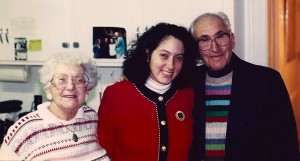There are many reasons that I’ve been thinking a lot about my grandfather lately. For starters, I’m hard at work on a talk that I’ll deliver next week for a conference here in New York on “German-Speaking Jews in New York: Their Immigration and Lasting Presence.” If you’ve been following my book-related blog posts for awhile, it’s probably not a surprise that I’ll be speaking about two German-speaking Jews in New York who meant a great deal to me: my paternal grandparents, whose lives and stories provided much of the inspiration for my story collection, Quiet Americans.
My grandfather, in particular, has been on my mind because he passed away fourteen years ago this week. This means that at Sabbath services this weekend, his name will be read from the yahrzheit list, which reminds us of these anniversaries. He will be remembered as “Sam S. Dreifus.” In the family, he was frequently and affectionately referred to as “Sam S.,” with the invented middle initial serving as a reminder that his original first name, back in Germany, was “Sigmar.”
Like the character of Josef Freibug, who appears in several of the stories in Quiet Americans, my grandfather had an unenviable childhood, and, for that matter, a not-so-easy life after that. He was a “quiet American” in multiple respects. What seems most remarkable to me is that he never spoke about the challenges that he’d faced basically from birth. Which may help explain why I, blessed with a much more privileged set of life circumstances, have been so drawn to imagining fuller pictures of my grandfather’s background and experiences based on the available true-life details. (Some of this I’ve also written about here.)

I suspect that some of my grandfather’s “quiet” was innate, but it seems likely that his reticence was at least partially due to his having begun learning English relatively late, as an adult who lacked a formal education even in his native language. Still, as I think you’ll see in this photo, which was taken during Thanksgiving a few months after I graduated from college twenty years ago (yes, that’s a graduation photo taped to the kitchen cabinet behind us), my grandfather’s goodness and love shone through even without words. (What you can’t see is that the exception to his quiet came in his singing, especially when he chanted the Hebrew blessings, prayers, and songs that he loved so much.)
We miss you, Grandpa!
